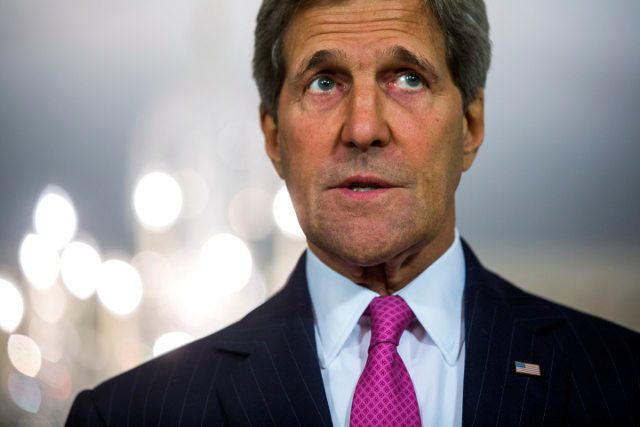SUMMARY
This is AI generated summarization, which may have errors. For context, always refer to the full article.

CAIRO, Egypt – US Secretary of State John Kerry said Saturday, September 13, that Egypt was on the frontline against “terrorism” after meeting its leadership to garner support to fight jihadists in Iraq and Syria.
Egypt’s formidable army is unlikely to take part in a military coalition against the Islamic State (IS) jihadists, but it has closely cooperated with the United States on counter-terrorism.
The Arab world’s most populous state boasts the prestigious Sunni Muslim authority Al-Azhar which Kerry said would fight back against the Islamic State’s use of the religion.
Washington says it is “at war” with IS and has named John Allen, a hawkish former commander in Afghanistan and Iraq, to coordinate its campaign against the movement that has seized large chunks of Iraq and neighbouring Syria.
Kerry, who flew in from Ankara, met President Abdel Fattah al-Sisi and Arab League chief Nabil al-Arabi.
Cairo’s involvement in the coalition may help to soothe its relations with Washington, after the United States suspended – then restored – military aid when the army ousted elected Islamist president Mohamed Morsi in July 2013.
Morsi’s successor, former army chief Sisi, is fighting Islamist militants in the restive Sinai Peninsula who have expressed support for the Islamic State.
“Egypt is on the frontline of the fight against terrorism, particularly when it comes to fighting extremist groups in Sinai,” Kerry told a news conference with Foreign Minister Sameh Shoukri.
Seeking Egypt’s approval
After securing the backing of 10 Arab governments this week, Washington is seeking a stamp of approval for its campaign from Egypt and its religious institutions, which include Al-Azhar university.
“As an intellectual and cultural capital in the Muslim world, Egypt has a critical role to play in publicly denouncing the ideology that ISIL disseminates,” Kerry said, using another acronym for IS.
Egypt has branded its Islamist political opposition as well as militants as “terrorists” vaguely linked to regional militant groups.
“We of course monitor the relation between the different organisations, and their ideology is linked,” Shoukri said.
Kerry said he also had a “frank” discussion on human rights in Egypt amid a bloody crackdown on the government’s opponents, and the jailing of three Al-Jazeera television journalists and secular dissidents.
Despite Washington saying it is “at war” with IS, Kerry has been reluctant to use the term, speaking instead of a “major counter-terrorism operation.”
On Friday, French President Francois Hollande travelled to Baghdad for talks ahead of an international conference on Iraq in Paris on Monday.
Kerry was in neighbouring Turkey to address the threat posed by the jihadists, who seized much of the Sunni Arab heartland north and west of Baghdad in June.
In Ankara, Kerry spoke of “a broad-based coalition with Arab nations, European nations, the United States and others.”
Turkey is a fellow NATO member but has so far refused to open its air bases to US forces and other coalition members.
A Turkish official told AFP that Ankara’s hands were tied by concern for 49 Turks, including diplomats and their children, kidnapped when IS seized Iraq’s second city Mosul in June.
Spate of atrocities
In Jeddah on Thursday, Kerry gained the support of 10 Arab nations for the push to weaken IS, whose appeal has drawn volunteers from around the world.
But Washington has insisted it will not work with President Bashar al-Assad of Syria, where three and a half years of conflict has allowed the emergence of IS, the most violent and powerful group in modern jihad.
Atrocities in areas it controls include attacks on ethnic and religious minorities and beheadings of American journalists and enemy soldiers, many of which it has recorded and posted on line.
Under mounting criticism for not taking swifter action, US President Barack Obama set out a strategy on Wednesday to stamp out the group, including air strikes in Syria and expanded operations in Iraq.
The CIA put the number of IS fighters at 20,000 to 31,500 in Iraq and Syria, up to three times the previous estimate.
US aircraft have carried out more than 150 strikes in Iraq since early August.
Washington plans to help revamp the Iraqi army, which withered under the IS-led onslaught in June, and has announced it will fly combat missions from an airbase in the Kurdish regional capital Arbil.
Iraqi Prime Minister Haidar al-Abadi on Saturday ordered his country’s air force to stop bombarding populated areas in a bid to minimise civilian casualties, a move welcomed by the United Nations.
Three years after the end of the nearly nine-year US military presence in Iraq, which some observers say nurtured what is now IS, Obama has also been careful to stress to war-weary Americans that he will not commit ground forces. – Rappler.com
Add a comment
How does this make you feel?
There are no comments yet. Add your comment to start the conversation.